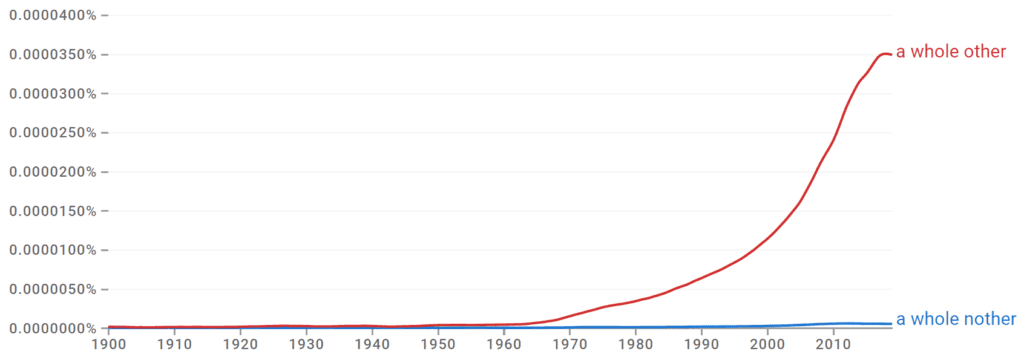Nother is a nonstandard spelling. Surprisingly enough, it has been in use since the 13th century, making it familiar and acceptable to use despite its strange grammatical sound.
The phrase a whole nother is interchangeable with the phrase a whole other. Both are correct, although a whole nother is more common in informal speech and writing. Let’s take a look at the history of the word nother and its related phrase, a whole nother, to determine how you can best use it in your speech and writing.
What Does the Term “A Whole Nother Mean”?

The common phrase a whole nother, formed by splitting the adjective another, makes no sense from a logical or grammatical standpoint, but it is often used informally or to create a colloquial tone in writing.
A whole nother serves as an adjectival phrase to mean “completely different” and is used to highlight a drastic change in something.
Because it is informal, the phrase might be considered out of place in any type of serious writing and is more commonly used in speech.
For example:
- The electric/hybrid conception for vehicles is a whole nother animal that is surprisingly ignored by those pushing all-electric solutions.
- The hockey player moved the puck down the ice towards the goal, but scoring was a whole nother matter.
- She doesn’t understand that her argument brings attention to a whole nother problem that can’t be addressed until we solve the first part of the equation.
Many writers insert an apostrophe in “a whole ‘nother,” but this would logically indicate that the writer means a whole another, which makes even less sense than a whole nother. So, DO NOT use an apostrophe with the word nother when used in the phrase a whole nother, as it would make the phrase confusing and grammatically incorrect.
Is Nother a Word? Origins and Etymology
The word nother is not a made-up word. In fact, it has been in use since the 13th century as a misdivision of the word another. It was commonly seen in the word nother-gates, an adjective to mean “not otherwise.” It also was quickly adapted into other phrases in the centuries following, such as in the 14th-century adaption of “no other” as no nother.
It is likely this misdivision occurred due to the Old English word noðer, a contraction of ne oðer to mean “no other.”
Which Is Better? A Whole Nother or A Whole Other?

The fact that the word nother doesn’t roll off the tongue quite as easily as the word other makes the expression a whole other much more popular overall and more grammatically correct as well.
A whole other makes more sense, and there are one-word equivalents, such as different, separate, and unrelated, that are usually better in formal contexts.
For example:
- Even though they had broken up, his apologies took their relationship to a whole other level, and they began to work things out.
- The youth league took the local playoffs to a whole other level, inviting professional ball players in to work with and inspire the children.
Let’s Review
The phrase a whole nother serves as an adjectival phrase to point out that something is totally different from what was first perceived. Even though some people think the word nother isn’t actually a word, it has been recognized since the 13th century and is usually used in informal speech and writing.
A whole other is a better option, especially when using the phrase in writing.

Comments are closed.